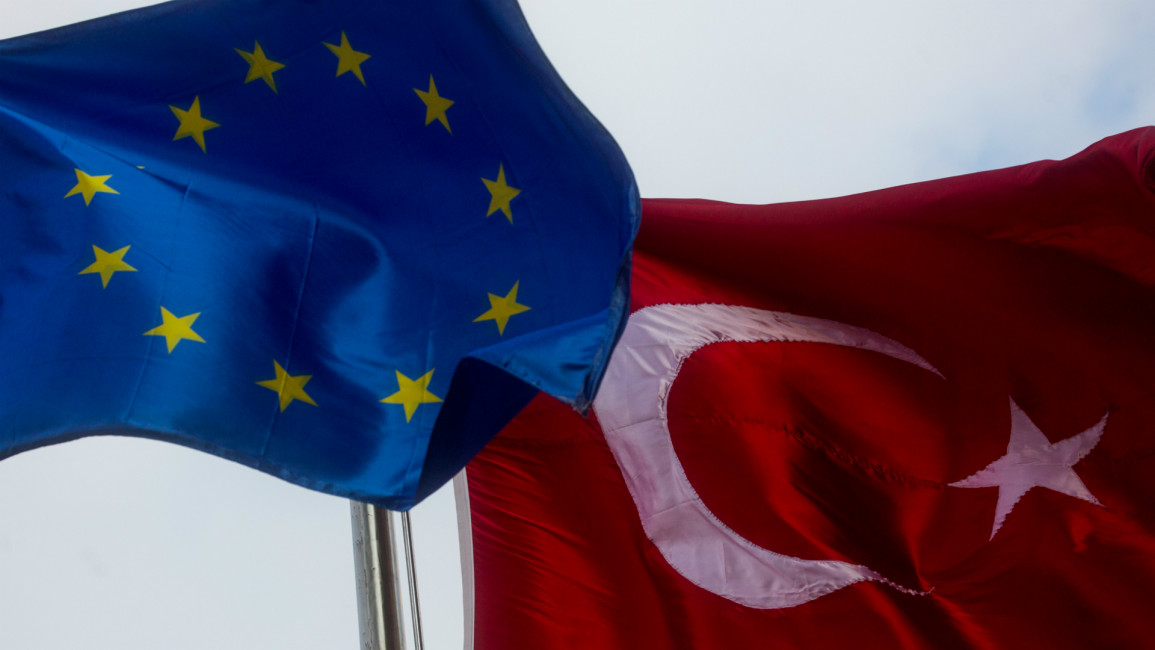EU proposes to expand trade deal with Turkey
EU proposes to expand trade deal with Turkey
The EU will consider upgrading trade-ties with Turkey following reluctance to revive membership talks.
2 min read
Turkey is now the EU's fifth largest partner in goods trade [Getty]
The European Union proposed Wednesday expanding its 1996 trade agreement with Turkey in a bid to improve ties that have been strained over Ankara's stalled negotiations to join the bloc.
The European Commission, the EU executive, said upgrading trade ties was in line with terms of the fragile March deal for Turkey to curb migrants entering Europe.
It said it asked the European Council, which groups the 28 member states, for a mandate to launch talks with Turkey to modernise the two-decade-old customs union.
"By making this proposal, the commission continues to deliver on the commitments it has made," the commission said in a statement.
Turkish President Recep Tayyip Erdogan has lashed out at EU reluctance to revive membership talks and threatened to cancel the March deal which has curbed the mass influx of refugees and migrants into the 28-nation bloc.
He has also accused the EU of failing or being slow to deliver on other commitments under the March deal, such as visa-free travel and funds for refugees on Turkish territory.
The accession talks stalled after a failed coup in July by a rogue Turkish military faction was followed by a crackdown that saw mass arrests of not only officers but also journalists, activists and academics and others.
Turkey formally applied to become an EU member in 1987 and accession talks only began in 2005, even though Ankara's aspirations to become part of the bloc date back to the 1960s.
"Modernising the Customs Union to reflect current EU-Turkey trade relations would bring substantial economic benefits for both partners," the commission said.
"The modernisation and extension of the Customs Union could unlock further opportunities for EU companies in the agri-food and services sectors and the public procurement market," it added.
At about 140 billion euros ($146 billion) annually, Turkey is now the EU's fifth largest partner in goods trade that has increased fourfold since 1996, the commission said.
The EU is Turkey's main trading partner, representing 41 percent of Turkey's global trade, it said.
The European Commission, the EU executive, said upgrading trade ties was in line with terms of the fragile March deal for Turkey to curb migrants entering Europe.
It said it asked the European Council, which groups the 28 member states, for a mandate to launch talks with Turkey to modernise the two-decade-old customs union.
"By making this proposal, the commission continues to deliver on the commitments it has made," the commission said in a statement.
Turkish President Recep Tayyip Erdogan has lashed out at EU reluctance to revive membership talks and threatened to cancel the March deal which has curbed the mass influx of refugees and migrants into the 28-nation bloc.
He has also accused the EU of failing or being slow to deliver on other commitments under the March deal, such as visa-free travel and funds for refugees on Turkish territory.
The accession talks stalled after a failed coup in July by a rogue Turkish military faction was followed by a crackdown that saw mass arrests of not only officers but also journalists, activists and academics and others.
Turkey formally applied to become an EU member in 1987 and accession talks only began in 2005, even though Ankara's aspirations to become part of the bloc date back to the 1960s.
"Modernising the Customs Union to reflect current EU-Turkey trade relations would bring substantial economic benefits for both partners," the commission said.
"The modernisation and extension of the Customs Union could unlock further opportunities for EU companies in the agri-food and services sectors and the public procurement market," it added.
At about 140 billion euros ($146 billion) annually, Turkey is now the EU's fifth largest partner in goods trade that has increased fourfold since 1996, the commission said.
The EU is Turkey's main trading partner, representing 41 percent of Turkey's global trade, it said.



